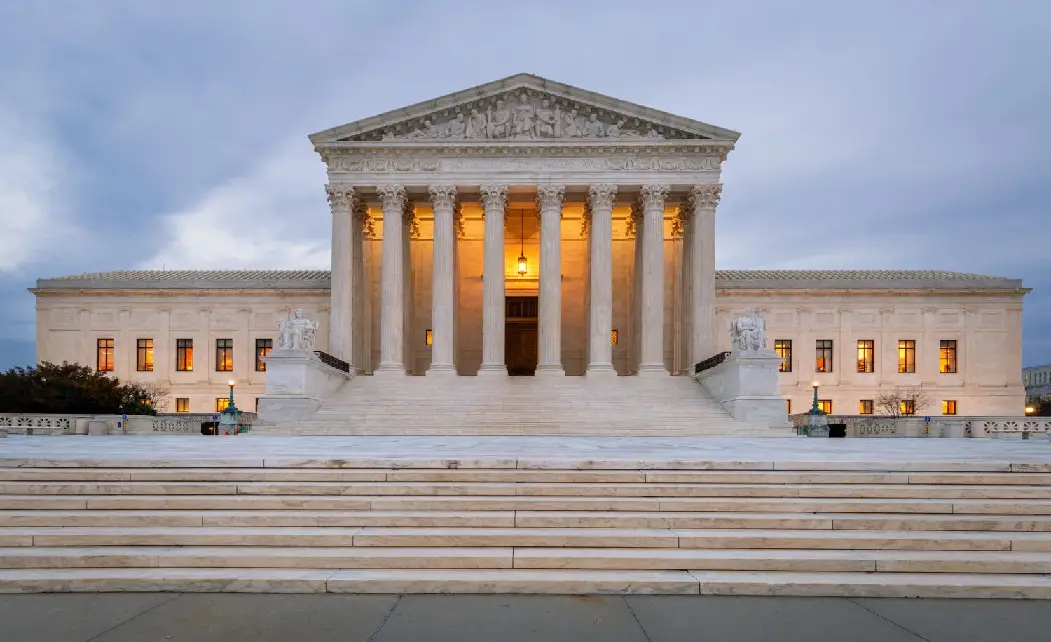The United States Supreme Court confronts a pivotal moment in American civil rights law as it considers whether to hear a case that could fundamentally reshape marriage equality. Former Kentucky county clerk Kim Davis has petitioned the nation’s highest court to overturn Obergefell v. Hodges, the landmark 2015 decision that established same-sex marriage as a constitutional right, setting up a potential collision between religious liberty and civil rights protections that could affect millions of Americans.
The Davis Challenge: From Local Defiance to National Constitutional Question
Kim Davis transformed from an obscure county official to a national symbol when she refused to issue marriage licenses to same-sex couples in Rowan County, Kentucky, following the Obergefell decision. Citing her Christian beliefs as incompatible with recognizing same-sex unions, Davis’s defiance of federal court orders led to six days in jail for contempt of court, making her both a martyr figure for religious conservatives and a symbol of institutional discrimination for LGBTQ+ rights advocates.
The legal journey that began with Davis’s individual act of conscience has evolved into a comprehensive constitutional challenge. Her attorney, Matthew Staver, has crafted a petition that goes beyond Davis’s personal circumstances to question the fundamental legal reasoning underlying marriage equality itself. The case represents the most direct challenge to same-sex marriage rights since their establishment nearly a decade ago.
The timing of this challenge coincides with a Supreme Court that has demonstrated willingness to overturn longstanding precedents, most notably in the 2022 Dobbs v. Jackson Women’s Health Organization decision that eliminated constitutional abortion rights. This precedent of reversing established rights has emboldened advocates like Staver to pursue similarly ambitious legal strategies, arguing that Obergefell was “egregiously wrong” and lacks constitutional foundation.
Constitutional Foundations Under Attack
Staver’s petition represents a sophisticated assault on the constitutional doctrine of substantive due process, which formed the legal foundation for marriage equality recognition in Obergefell. The petition characterizes the original decision as “deeply damaging” and argues that it creates “atextual constitutional rights” without proper constitutional basis.
This attack extends beyond marriage equality to challenge a fundamental mechanism through which the Supreme Court has recognized unenumerated constitutional rights throughout American history. Substantive due process has been the basis for numerous landmark decisions protecting individual liberty, from parental rights to contraception access to intimate relationships, making the constitutional stakes far broader than marriage equality alone.
The legal philosophy underlying this challenge reflects an originalist interpretation of constitutional rights that would limit judicial recognition of rights not explicitly enumerated in the constitutional text. This approach, associated with conservative justices like Clarence Thomas and Samuel Alito, prioritizes historical understanding of constitutional language over evolving interpretations that adapt to contemporary circumstances.
Religious Liberty Versus Civil Rights: The Central Tension
The Davis case crystallizes fundamental tensions between religious liberty protections and civil rights guarantees that have become increasingly prominent in American constitutional law. Davis’s supporters argue that government employees should not be forced to violate their religious convictions in performing official duties, while civil rights advocates contend that public officials cannot selectively refuse to enforce laws based on personal beliefs.
These religious liberty arguments extend beyond individual conscience rights to encompass broader questions about the role of faith in public life and the extent to which religious believers can maintain their convictions while participating in government service. The resolution of these issues could affect numerous areas where religious convictions might conflict with official responsibilities, from healthcare providers to educators to business owners.
The case also raises important questions about the scope of religious accommodations in government employment and whether such accommodations might constitute government endorsement of particular religious views, potentially violating the Establishment Clause while denial of accommodations could violate Free Exercise protections.
Supreme Court’s Conservative Shift Creates Uncertainty
The Supreme Court’s composition has changed significantly since 2015, with three conservative justices appointed by former President Donald Trump creating a solid conservative majority that has shown willingness to overturn established precedents. This shift in judicial philosophy has created uncertainty about the stability of numerous constitutional rights, including marriage equality.
Justice Clarence Thomas has been particularly vocal in criticizing substantive due process doctrine and has specifically suggested reconsideration of decisions like Obergefell. His influence within the conservative majority could be decisive in determining whether the Court agrees to hear Davis’s challenge and how it might rule on the constitutional questions presented.
However, other conservative justices may be more hesitant to overturn marriage equality due to its broad public acceptance and the significant social disruption that could result. The practical consequences of overturning Obergefell could be more complex and far-reaching than the abortion decision, potentially affecting hundreds of thousands of existing marriages and creating legal chaos in states without marriage equality laws.
Expert Analysis and Likelihood Assessment
Legal scholars have offered varying assessments of Davis’s chances of success, with most expressing skepticism that the Supreme Court would completely overturn marriage equality despite the conservative majority’s demonstrated willingness to reconsider established precedents. The consensus among many experts suggests that while the Court might expand religious liberty protections, eliminating the constitutional right to same-sex marriage represents a more dramatic step.
Daniel Urman, a law professor at Northeastern University, suggests that the most likely outcome would be expansion of religious objector rights rather than elimination of marriage equality itself. This middle-ground approach would allow the Court to address religious liberty concerns while avoiding the massive social disruption that would result from overturning Obergefell entirely.
Paul Collins from the University of Massachusetts Amherst has noted that the specific circumstances of Davis’s case may not provide the ideal vehicle for challenging marriage equality, as the central legal issue involves damages for violating constitutional rights rather than the validity of those rights themselves.
Public Opinion and Cultural Context
The cultural landscape surrounding same-sex marriage has changed dramatically since 2015, with public opinion polls consistently showing majority support for marriage equality across diverse demographic groups. This broad public acceptance creates a political context that differs significantly from other controversial issues like abortion, where public opinion remains more divided.
The integration of same-sex marriage into American social and legal institutions over the past decade has created practical realities that would be difficult to unwind. Hundreds of thousands of same-sex couples have married, adopted children, and built lives together under legal protections established by Obergefell, creating constituencies with direct stakes in preserving marriage equality.
Generational differences in attitudes toward LGBTQ+ rights are particularly pronounced, with younger Americans across all political affiliations expressing much higher levels of support for marriage equality than older generations. These demographic trends suggest that opposition to same-sex marriage may continue to decline over time regardless of legal developments.
Potential Consequences of Constitutional Reversal
If the Supreme Court were to overturn Obergefell, the immediate legal consequence would be a return of marriage policy to individual state control, creating a patchwork of laws that could vary dramatically across the country. States with existing marriage equality protections would likely maintain those laws, while states without such protections might prohibit same-sex marriage or fail to recognize marriages performed elsewhere.
The practical implications for same-sex couples could be severe, particularly for those living in states that would restrict marriage rights following an Obergefell reversal. Interstate mobility, employment opportunities, and family planning decisions could all be affected by varying state laws regarding marriage recognition and related benefits.
Federal benefits and protections tied to marriage recognition would create additional complexity, as federal agencies would need to determine whether to recognize same-sex marriages performed in some states but not others. This could affect everything from Social Security benefits to tax filing status to immigration rights for binational couples.
Broader Implications for Religious Liberty and Civil Rights
The constitutional principles at stake extend beyond marriage equality to encompass broader questions about religious accommodation in public employment and the scope of conscience protections for individuals whose faith conflicts with civil rights laws. Healthcare providers, educational institutions, and business owners could all be significantly affected by expanded religious liberty protections.
The precedent established in resolving Davis’s case could influence whether healthcare professionals can decline to provide care that conflicts with their religious beliefs, whether teachers can seek exemptions from implementing inclusive policies, and whether business owners can refuse services based on religious objections to serving LGBTQ+ customers.
Strategic Considerations and Court Decision
The Supreme Court’s decision about whether to hear Davis’s case involves complex strategic considerations beyond the legal merits of her constitutional arguments. The procedural posture of the case, timing considerations following the controversial Dobbs decision, and the availability of alternative cases presenting similar issues in cleaner contexts all influence the justices’ decision-making.
The Court often prefers cases that present constitutional issues clearly without unnecessary procedural complications. Davis’s case, focused on damage claims rather than the validity of marriage equality itself, may not provide the ideal framework for addressing broader constitutional questions about same-sex marriage rights.
Constitutional Democracy at a Crossroads
The Supreme Court’s consideration of Davis’s challenge represents fundamental questions about constitutional interpretation, religious liberty, civil rights, and the stability of established legal precedents in American democracy. The case arrives when the Court’s conservative majority has demonstrated unprecedented willingness to overturn longstanding constitutional protections, creating genuine uncertainty about marriage equality’s future.
The constitutional stakes extend beyond same-sex marriage to encompass the broader doctrine of substantive due process that has been the foundation for numerous individual liberty protections throughout American history. A decision to overturn Obergefell could potentially affect contraception rights, parental authority, intimate relationship privacy, and other fundamental freedoms.
Regardless of the ultimate outcome, the Davis case highlights ongoing tensions between religious liberty and civil rights that continue to shape American constitutional law. The resolution of these issues will likely influence American society for generations, determining whether constitutional rights can remain stable in the face of changing judicial philosophy and whether the promise of equal treatment under law can coexist with robust protections for religious conscience in an increasingly diverse democracy.
The Supreme Court’s consideration of this case represents a crucial test of constitutional democracy and the durability of legal protections for minority rights in the American system, with implications extending far beyond the immediate question of marriage equality to the fundamental nature of constitutional rights in contemporary America.

James Jenkins is a celebrated Pulitzer Prize-winning author whose work has reshaped the way readers think about social justice and human rights in America. Raised in Atlanta, Georgia, James grew up in a community that instilled in him both resilience and a strong sense of responsibility toward others. After studying political science and creative writing at Howard University, he worked as a journalist covering civil rights issues before dedicating himself fully to fiction. His novels are known for their sharp, empathetic portraits of marginalized communities and for weaving personal stories with broader political realities. Jenkins’s breakout novel, Shadows of Freedom, won national acclaim for its unflinching look at systemic inequality, while his more recent works explore themes of identity, resilience, and the fight for dignity in the face of oppression. Beyond his novels, James is an active public speaker, lecturing at universities and participating in nonprofit initiatives that support literacy and community empowerment. He believes that storytelling is a way to preserve history and inspire change. When not writing, James enjoys jazz music, mentoring young writers, and traveling with his family to explore cultures and stories around the world.









